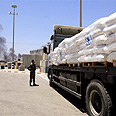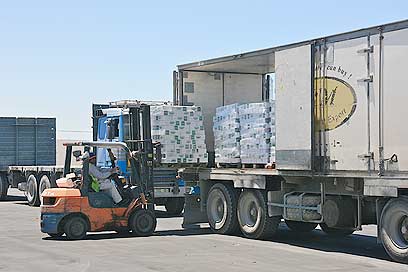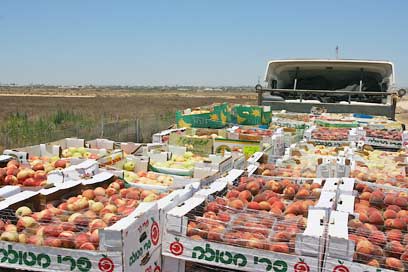
Gaza crossings remain closed
Israeli produce allowed into the Gaza Strip following the overturning of Hamas' decision to ban trucks
According to a briefing by the CLA, their mission to facilitate the movement of goods and humanitarian aid to Gaza has not changed since the Hamas takeover, but they stressed that there was no coordination between Israel and the Hamas.
Instead the CLA works directly with Palestinian merchants and international organizations to meet the demand for basic goods and other items in Gaza. However, due to the lack of Palestinian Authority officials conducting security checks on their side, no goods have been shipped out of the Gaza Strip to the Israel since the Hamas takeover.
Col Nir Press of the CLA said, “When attacks close the crossings, the responsibility is on the Palestinian side. Hamas doesn’t recognize Israel, doesn’t want any connection to Israel,” he continued, “but we try to meet the needs of the Palestinian people.”
As an example of the present situation, he described the scene at Kerem Shalom during Tuesday’s attack when some 10 mortars struck the crossing, one landing on the Egyptian side of the border. Two trucks were in the process of transferring milk to the Palestinians when the mortar attack began, stranding the trucks all day in the sun and spoiling the milk.

Goods transfered from an Israeli truck to a Palestinian one at Kerem Shalom (Photo: Courtesy of www.imagesofisrael.com)
The Erez Crossing in the northern part of the Strip is the main transit point for Palestinian workers to enter Israel; however no workers have entered since March 2006. The CLA says that some Palestinian merchants are still allowed into Israel to meet with their Israeli suppliers to make the necessary arrangements for purchasing and delivering the various supplies, but that in the absence of the PA these merchants must coordinate directly with the CLA themselves. Erez is also open for journalists, diplomats, and for Palestinians who need special medical treatment in Israel.
Nahal Oz, which is used for transferring fuel, remains open six days a week. According to the CLA, the amount of fuel transferred is not limited by any restrictions from the Israelis, but rather on the demand for fuel as communicated by the Palestinians and various international organizations.
Last Tuesday alone, 368,000 liters of heavy diesel, 400,000 liters of diesel, 50,000 liters of petrol, and 250 tons of gasoline were transferred to the Gaza Strip, according to the CLA. The fuel is transferred from trucks on the Israeli side through underground pipes to the Palestinian side, there is no direct contact between the two peoples.
The Karni Crossing is the main transit point for goods going into and out of the Gaza Strip, however the crossing has been closed since June 12 due to threats and attacks by Palestinian terrorists. Despite the closure, emergency food supplies, such as wheat, soya, and other grains, continue to be transferred to Gaza by way of a massive 220-meter long conveyor belt.
Some 50 trucks a day dump the grain into a pit on the Israeli side where it fills the conveyor and moves to the Palestinian side. The conveyor is normally used for transferring aggregates for building, such as rock and sand, but was cleaned by the Israelis for transferring the food supplies to meet the current humanitarian needs.

Israeli fruits waiting to be delivered into Gaza at the Sufa Crossing (Photo: Courtesy of www.imagesofisrael.com)
The Sufa Crossing, located next to the kibbutz with the same name, is now the workhorse for transferring goods from Israel to the Palestinians in Gaza. Some 125 trucks can deliver their various cargo here each day, including fresh fruit, hay, and pipes for a civil water project funded by overseas donors.
The crossing is open until three in the afternoon for Israeli trucks to deposit their cargo into a shared holding zone, after which time the Palestinians come in and load the goods onto their trucks for delivery throughout Gaza. Sufa is also a main point used for the IDF to enter Gaza during any military incursions into the Strip, and several tanks and other armored vehicles are stationed nearby at all times.
Kerem Shalom is the southern most crossing located at the three-way intersection of Israel, Egypt, and the Gaza Strip. It was from near this point that Hamas terrorists launched an attack against IDF forces over a year ago, killing three and taking Gilad Shalit hostage. The crossing can accommodate up to 20 cargo trucks per day, but Israel is working to expand the crossing and double its throughput.
Kerem Shalom is used primarily for the more sensitive goods, such as eggs, medicines, and refrigerated products like dairy. The goods are transferred from Israeli trucks to “sterile” Palestinian ones, trucks that never leave the crossing terminal, and from there onto regular Palestinian trucks.
Contrary to many reports, Israel has not cut off Gaza after Hamas’s takeover, but rather has used the existing terminals and systems to transfer goods directly to Palestinian merchants and international organizations without the benefit of full coordination from the other side.
To visit Will King's website - click here










